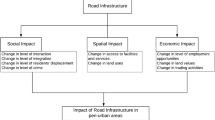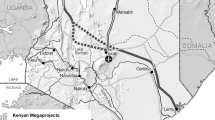Abstract
South Africa’s experience with spatial economic interventions has had a chequered history with the Industrial Development Zone programme most recently failing to generate anticipated development. Current policy has shifted to the imminent launch of Special Economic Zones (SEZs) as tools for national (re)industrial development and supporting underdeveloped regions. This paper reflects on recent South African experience with spatial economic interventions and international experience with SEZs paying particular attention to their strengths, weakness and key establishment considerations. It is argued that unfolding South African SEZ planning can be strengthened by learning from the ‘good’ and ‘bad practice’ of international SEZs.
Similar content being viewed by others
References
Aggarwal, A. (2007). Impact of special economic zones on employment, poverty and human development. New Delhi: Indian Council for Research on International Economic Relations.
Bek, D., Binns, T., & Nel, E. (2004). Catching the development train: perspectives on top down and bottom up development in post-apartheid South Africa. Progress in Development Studies, 4, 22–46.
Brautigam, D. (2011). African Shenzhen: China’s special economic zones in Africa. The Journal of Modern African Studies, 49, 27–54.
Brun, J. F., Combers, J. L., & Renard, M. K. (2002). Are there spillover effects between coastal and non-coastal regions in China. China Economic Review, 13, 161–169.
Centre for Development and Enterprise (CDE). (2012). Roundtable special economic zones: lessons for South Africa from international evidence and local experience. CDE Roundtable No. 19. Johannesburg: CDE.
Cisse, D. (2012). South Africa’s special economic zones—inspiration from China? Stellenbosch: University of Stellenbosch Centre for Chinese Studies Commentary.
Department of Trade and Industry (DTI). (2011). Industrial Policy Action Plan: 2011/12-2013/14. Pretoria: DTI.
Dohrmann, J. A. (2008). Special economic zones in India—an introduction. ASIEN- The German Journal on Contemporary Asia, 106, 60–80.
DTI. (2011). Medium-term strategic plan: 2011–2014. Pretoria: DTI.
DTI (2012a). Special economic zones policy & bill, 2011. DTI, Presentation to Portfolio Committee on Trade and Industry 25 January, Pretoria.
DTI (2012b). Policy on the development of special economic zones in South Africa. Pretoria: DTI published in Government Gazette 34968, 23 January.
DTI. (2012c). Industrial Policy Action Plan: 2012/13–2014/15. Pretoria: DTI.
Farole, T. (2010). Second best? Investment climate and performance in Africa’s special economic zones (p. 5447). Washington: The World Bank Policy Research Working Paper.
Farole, T. (2011). Special economic zones in Africa: comparing performance and learning from the global experience. Washington: The World Bank.
Graham, E. M. (2004). Do export processing zones attract FDI and its benefits? International Economics and Economic Policy, 1, 87–103.
Jain, P. (2008). Special economic zone: A boon for Indian economy. www.legalserviceindia.com/article/1251-Special-Economic-Zone.html [accessed 12 September 2011].
Jauch, H. (2002). Export processing zones and the quest for sustainable development: a Southern African perspective. Environment and Urbanization, 14, 101–113.
Lal, H. H. (2006). SEZs and foreign investment in China. Asian Perspective, 30(3), 69–97.
Marais, H. (2011). South Africa: pushed to the limits. Cape Town: UCT.
McCallum, J. K. (2011). Export processing zones: comparative data from China, Honduras, Nicaragua and South Africa (p. 21). Geneva: International Labour Organization Dialogue Working Paper No.
McKenzie, J. (2012). Oil repair hub. Engineering News, 30 November–6 December, 12 and 21.
Mishra, N. (2008). SEZ (Special Economic Zone)—An overview, challenges and future. http://www.neerajmishra.worldpress.com/2008/07/26/sez-special-economic-zone-an-overview-challenge-and-future [accessed 12/09/2011].
Narrainen, N., & Charitar, C. (2009). Africa-Asia experience exchange on special economic zones and competitive clusters, 1–13 May 2009. Singapore: Ministry of Finance and Economic Development.
Nattrass, N. (2011). The new growth path: game changing vision or cop-out? South African Journal of Science, 107(3/4), 1–8.
Naude, E. (2012). Case study of Blue IQ providing strategic economic infrastructure. Paper presented at Workshop on Gauteng 2055 Strategic Pathways, Johannesburg 28 November.
Nel, E. L. (1999). Regional and local economic development in South Africa: the experience of the Eastern Cape. Aldershot: Ashgate.
Ampah and Nyagah (2010). Africa’s export zones failing. www.tardemarksa.org/print/789 [accessed 12/09/2011].
Palit, A. (2009). Growth of special economic zones (SEZs) in India: issues and perspectives. Journal of Infrastructural Development, 1, 133–152.
Papadopoulos, N., & Malhotra, S. (2011). Export processing zones in development and international marketing. Journal of Macromarketing, 27, 148–161.
Robbins, G. (2008). Reflecting on South Africa’s post-apartheid experience with spatially informed economic development programmes. Trade and Industrial Policy Strategy; Department of Trade and Industry: Pretoria.
Rogerson, C. M. (2001). Spatial development initiatives in southern Africa: the Maputo development corridor. Tijdschrift voor Economische en Sociale Geografie, 92, 324–346.
Rogerson, C. M. (2002). Spatial development initiatives in South Africa. Geography, 87, 38–48.
Rogerson, C. M. (2008). Consolidating local economic development in post-apartheid South Africa. Urban Forum, 19, 307–328.
Shah, S. (2008). Special economic zones in South Asia: a comparative analysis of Bangladesh, Sri Lanka and India. Boston: School of Government, Harvard University.
Tomlinson, R., & Addleson, M. (Eds.). (1987). Regional restructuring under apartheid: urban and regional policies in contemporary South Africa. Johannesburg: Ravan.
Turok, I. (2011). Spatial economic disparities in South Africa: towards a new research and policy agenda. Cape Town: Human Sciences Research Council.
Wang, J. (2010). The economic impact of special economic zones: Evidence from Chinese Municipalities. https://editorialexpress.com/cgi-bin/conference/download.cgi?db_name=NASM2011&paper_id=239. Accessed 15 Nov 2011.
Wong, K.-Y., & Chu, D. K. Y. (1984). Export processing zones and special economic zones as generators of economic development: the Asian experience. Geografiska Annaler, 66B, 1–16.
Wong, S.-W., & Tang, B. (2005). Challenges to the sustainability of development zones: a case study of the Guangzhou Development District China. Cities, 22, 303–316.
Yeung, Y., Lee, J., & Kee, G. (2009). China’s special economic zones at 30. Eurasian Geography and Economics, 50, 222–240.
Zarenda, H. (2012). Special missing zones in South Africa’s policy on special economic zones. Stellenbosch: Tralac Trade Brief S12TB04/2012.
Acknowledgments
The University of Johannesburg provided research funding support which facilitated the completion of this paper.
Author information
Authors and Affiliations
Corresponding author
Rights and permissions
About this article
Cite this article
Nel, E.L., Rogerson, C.M. Special Economic Zones in South Africa: Reflections from International Debates. Urban Forum 24, 205–217 (2013). https://doi.org/10.1007/s12132-012-9184-7
Published:
Issue Date:
DOI: https://doi.org/10.1007/s12132-012-9184-7




